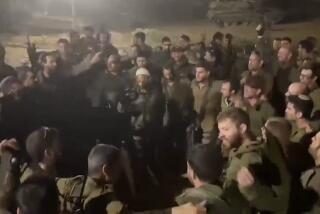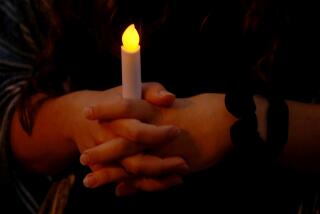Turning Shame Into Outrage
- Share via
It’s a tough call whether Abu Musab al-Zarqawi -- the Jordanian militant who is reportedly responsible for the videotaped butchery of Nicholas Berg -- is more stupid than he is brutal, or whether he is a bigger monster than he is a fool. Zarqawi’s own nauseating videotape makes the case for his indescribable brutality and may have inadvertently delivered his enemy from its own demoralization.
Americans were feeling so shamed, dishonored and demoralized by the repulsive images of prisoner abuse at Abu Ghraib that even many prominent war supporters were reconsidering the effort.
Dispirited analysts at the conservative National Review Online began looking for an exit from the occupation; blogger Andrew Sullivan asked himself whether, if he had known in advance how the occupation would proceed, he would have supported the war; New York Times columnist David Brooks even concluded that the United States misconceived the effect of its own power, and he pronounced the occupation an intellectual failure, even if it ultimately succeeds in establishing a liberal Iraq.
So what does Zarqawi do? In “retaliation” for the Abu Ghraib abuses, he stages a singularly abominable execution of a private American citizen who had been wandering around Iraq. The probable effect is to offer many Americans an exit from their own moral horror.
Mind you, Zarqawi’s ghouls in this video don’t merely behead Berg, as most accounts indicate. Beheading suggests a quick severing and a quick death.
What Zarqawi’s friends do is butcher Berg -- there’s no other word for it. They don’t use a sword or an ax; they use a knife. You can hear Berg screaming as Zarqawi’s gang hacks at his neck and then pulls at his head until it comes off his body. They then hold his bleeding head in front of the camera. The tape is appalling not only for its utter bloodthirstiness but also for the total absence of simple human empathy.
Elemental empathy is a primary measure of civilization. The shame that Americans felt at the Abu Ghraib images is rooted in such empathy. Even in the dehumanizing context of warfare, which strains the empathy of all its participants, this is savagery.
But if this is a moment of comparative atrocity, the issue becomes whether the Zarqawi horror is capable of having any effect on the Abu Ghraib matter. The probable answer is that although the murder tape obviously doesn’t make pictures of prisoner abuse any less disgusting or shameful, it does offer many of those who feel disgust and shame a different context in which to perceive those images.
The Abu Ghraib pictures reveal American soldiers humiliating their prisoners in a sadistic manner (in some images, the Americans are actually smirking). It’s a painful sight because it is cruel on its own terms (we don’t even know whether the terrorized individuals are actually guilty of anything) and because we regard such sadism as unworthy of our image of ourselves. By contrast, Zarqawi intentionally videotapes and distributes his bloody atrocity; the literal slaughter of an innocent is offered as an example of his righteousness. For Zarqawi, the question of unworthiness simply never enters the calculation; that the action is inhuman is its point.
Shameless brutality of this degree has the power to transform the shame of Zarqawi’s enemies. Zarqawi has reminded his enemies that, unlike him, they are at least capable of shame.
Zarqawi’s righteous snuff movie is an act of lunacy, a gift to his enemies, and, one hopes, an unwitting suicide note.
More to Read
Sign up for Essential California
The most important California stories and recommendations in your inbox every morning.
You may occasionally receive promotional content from the Los Angeles Times.










